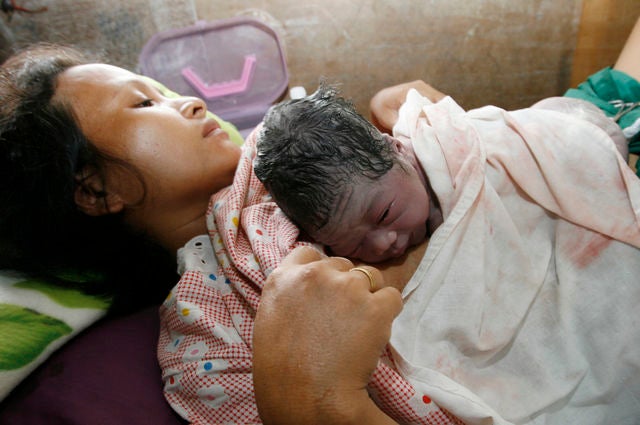Local expertise is driving improvements in maternal health: panel
A UNGA side event hosted by MSD for Mothers examined efforts to improve conditions around childbirth in India, Nigeria, Sierra Leone, and Kenya

Grassroots organizations working within communities are helping maternal health services regain ground lost to the pandemic, which pushed health care services to the breaking point.
That was one of the main takeaways from a UNGA side event last week hosted by MSD for Mothers to discuss strengthening systems for safer childbirth through locally-led solutions launched while global health efforts were focused on COVID-19. The Strengthening Systems for Safer Childbirth initiative aims to improve conditions around childbirth in India, Nigeria, Sierra Leone, and Kenya. The event, attended by academics, government officials, and private sector stakeholders, was held on September 21 in New York.
Panelists highlighted projects undertaken by NGOs, civil society, and social enterprises that are resulting in better health outcomes for mothers and newborns. The MSD for Mothers Initiative, they added, was helping improve maternal health conditions and access in these countries by focusing on local expertise and leadership.
Ben Nkechika of the Delta State Contributory Health Commission in Nigeria said expectant mothers in his country often avoided health clinics due to the cost. A health insurance scheme was set up so that pregnant women and children under five could access services, but women still turned to traditional practitioners. “You can imagine that with a multiple pregnancy or any complicated pregnancy – it was a bad situation,” he said.
In one case, a newly built clinic went unused until Nkechika and his colleagues stepped in and established trust in the community by going door-to-door to connect with the women personally. “Not one system works everywhere,” he explained, adding that improvements come about by adapting practices to specific environments.
Niranjan Saggurti, director at the Population Council for Greater Delhi, noted that 35 million women become pregnant every year in India, resulting in 28 million live births. Infant mortality rates have gone down, he said, due to efforts by both the public and private sectors. As of 2002, there were 300 maternal deaths per 100,000 live births in India, which was reduced to 113 deaths per 100,000 by 2018.
The decline was not even across the entire country, Saggurti said. “The problem,” he said, is that “antenatal and post-natal care continue to be a challenge.” Most women receive just four follow-up examinations after delivery – too few to substantially reduce mortality. He believes one solution is concentrating services such as post-natal and childhood care within one facility.
A coalition with askNivi, a digital provider that is launching a virtual marketplace in Assam to equip pregnant women with information and access to care, is one example of a collaboration that experts believe will result in further reductions in maternal mortality rates. “The key is to make it more contextual,” Saggurti said, “to hear voices from the local communities and to see how that matches with the general situation.”
Cynthia Kahumbura of Jacaranda Health in Kenya reported that there have been improvements in maternal health in her country overall: “Access has clearly increased, and we’re seeing more Kenyan women deliver in facilities than ever before.” However, she said a lot remains to be done. “A significant impact has been the quality gap in the health system, which has been stalling our progress,” she said, referring to the inequities faced by underserved women. The result is that the maternal mortality rate across the country has plateaued.
According to Dr. Austin Demby, Sierra Leone’s Minister of Health and Sanitation, his country is on track to see major gains in maternal health. “We’ve committed … to reduce infant mortality from 717 births [per 100,000] to under 300 in three years.” He acknowledged it is a lofty target, but said that “traditionally, disease programs have been vertical [but] we’re trying to change that paradigm by interpreting universal health coverage in our own language that we understand.”
"Active listening" backed up with action is critical to better health outcomes, such as keeping a close watch on pregnant women and keeping tabs on babies until they’re old enough to attend school, he said.
Dr. Demby noted that expectant mothers in his country are now using a smartphone app to identify nearby clinics when they go into labor, allowing them to choose where they want to give birth. By collecting data through the app, gaps in the system can be identified immediately and improved upon. “We’ve brought everybody together. Development partners, the ministry of health, civil society, traditional leaders to think about this as a nation,” he said.
How can we help you?
believes that the quickest path to improving health outcomes to identify positive outliers in health and help leaders implement lessons in their own countries.
With our network of in-country and cross-country partners, we research countries that have made extraordinary progress in important health outcomes and share actionable lessons with public health decisionmakers.
Our research can support you to learn about a new issue, design a new policy, or implement a new program by providing context-specific recommendations rooted in Exemplar findings. Our decision-support offerings include courses, workshops, peer-to-peer collaboration support, tailored analyses, and sub-national research.
If you'd like to find out more about how we could help you, please click . Please consider so you never miss new insights from Exemplar countries. You can also follow us on Twitter and LinkedIn.
